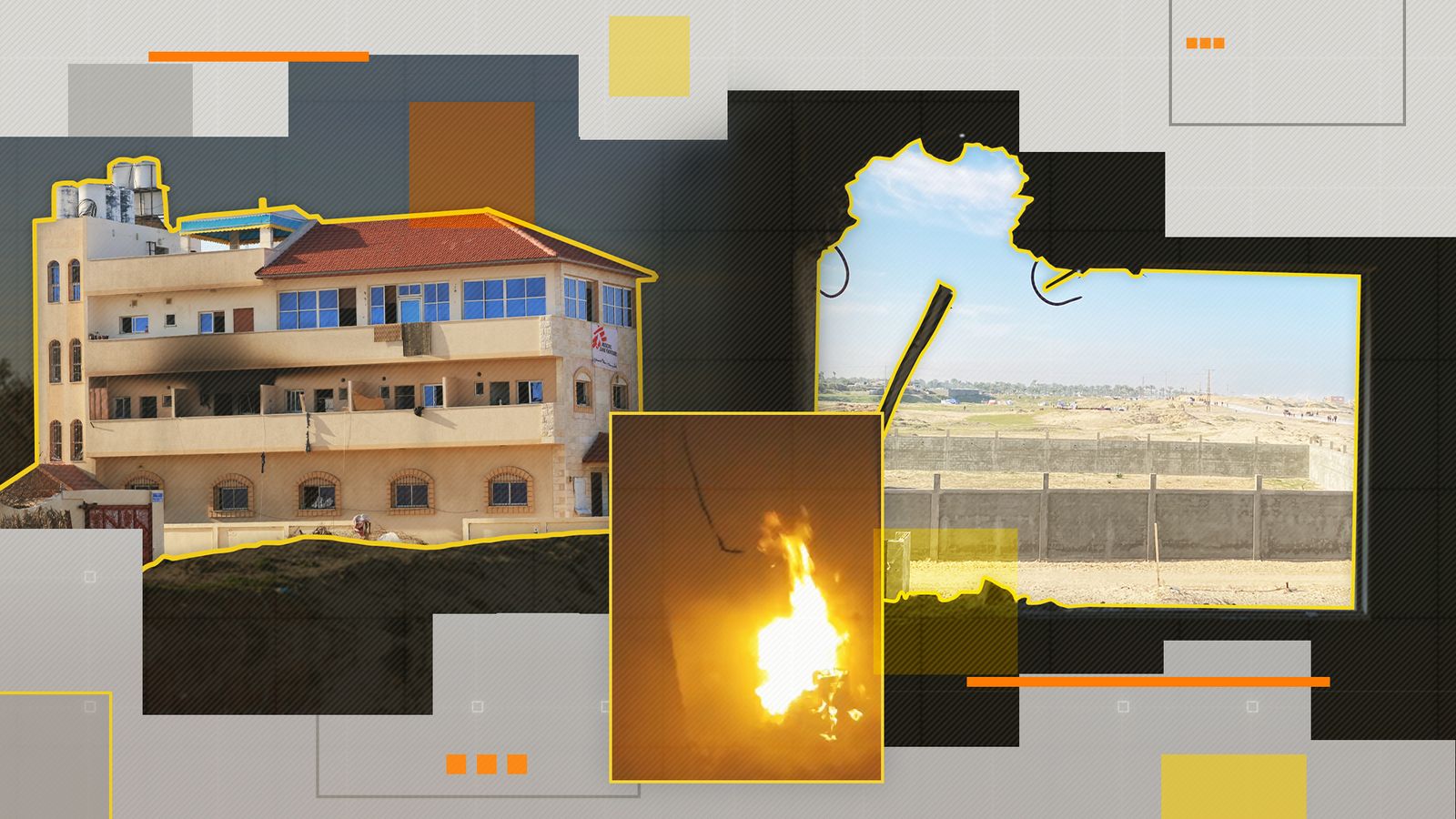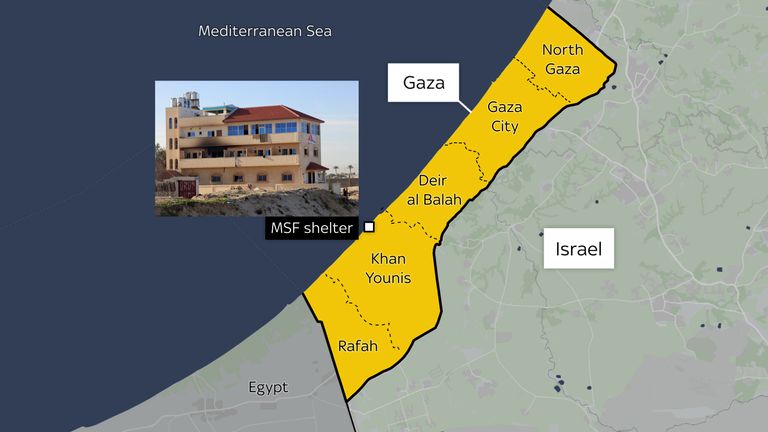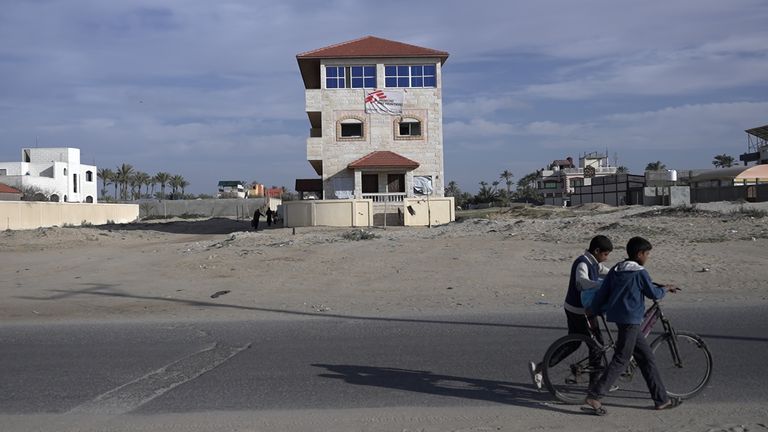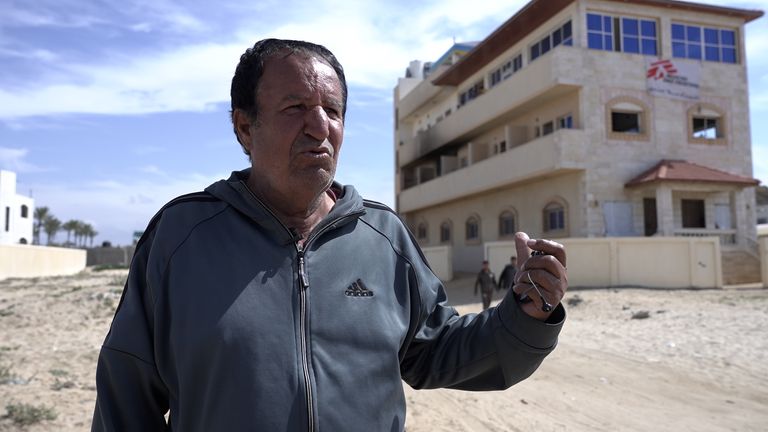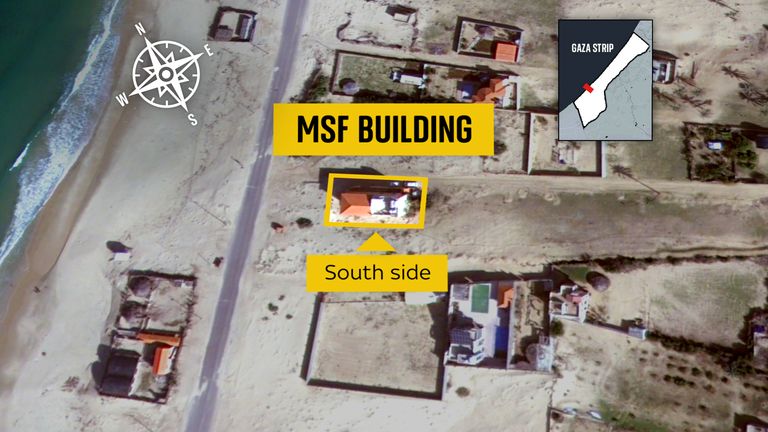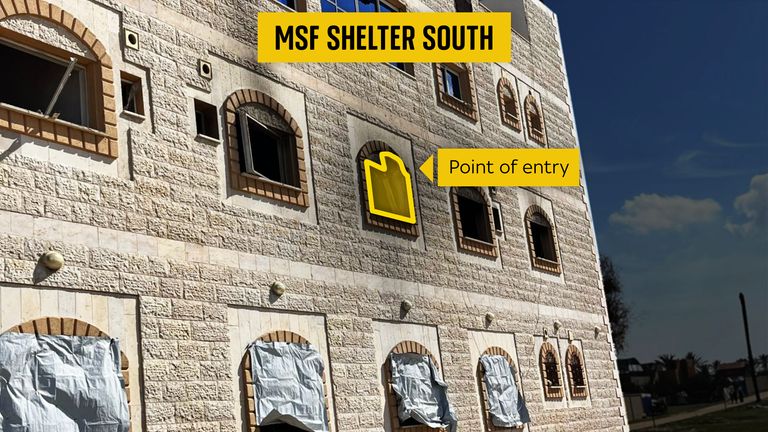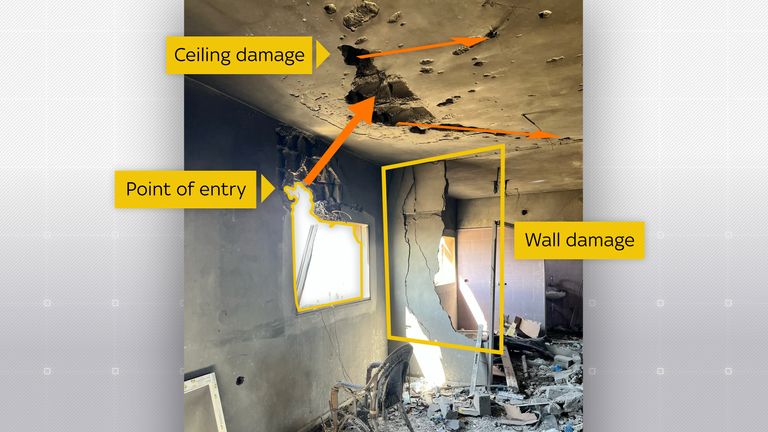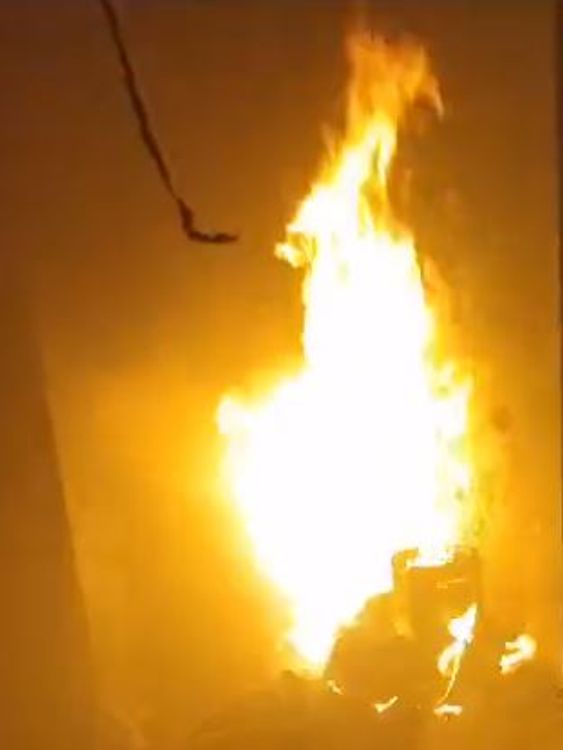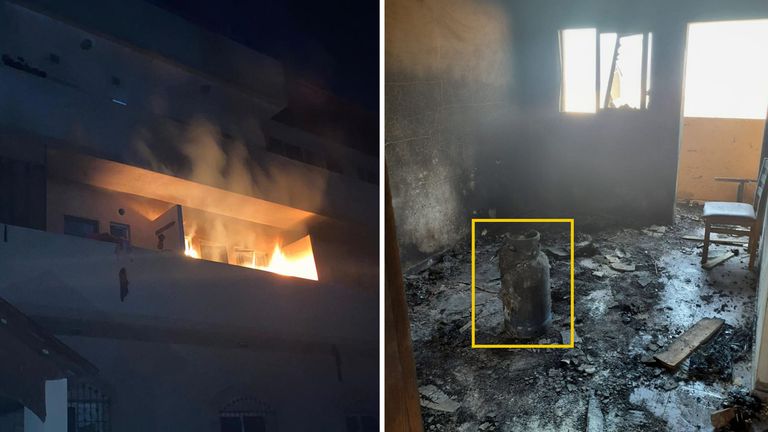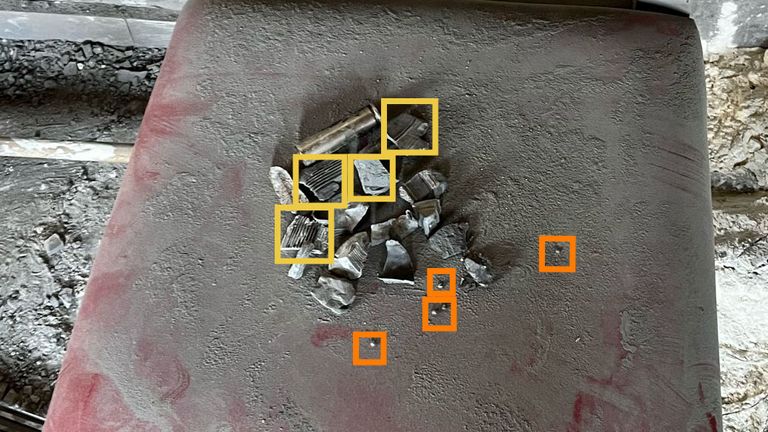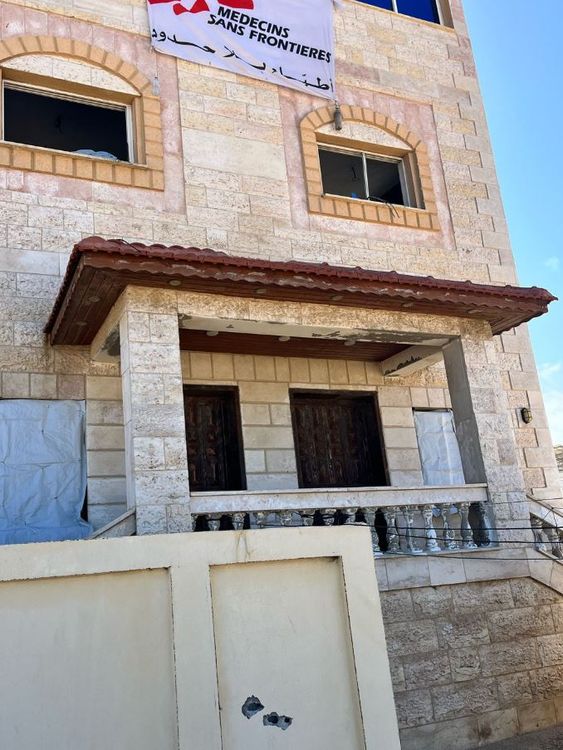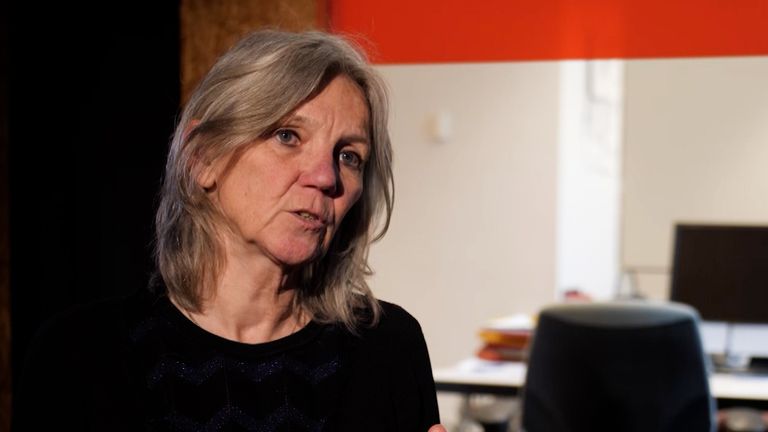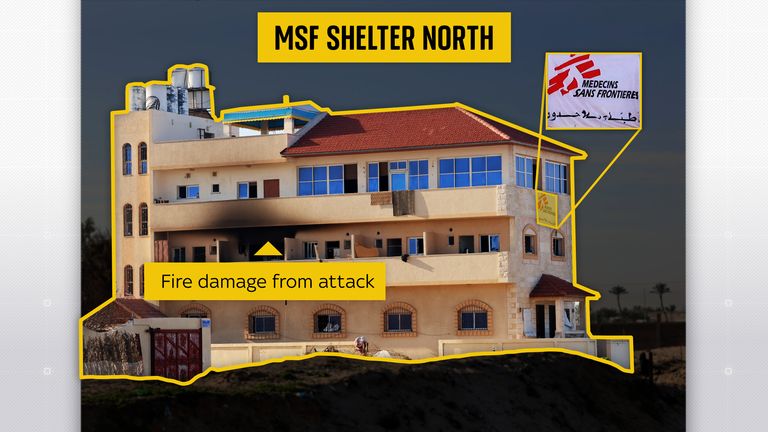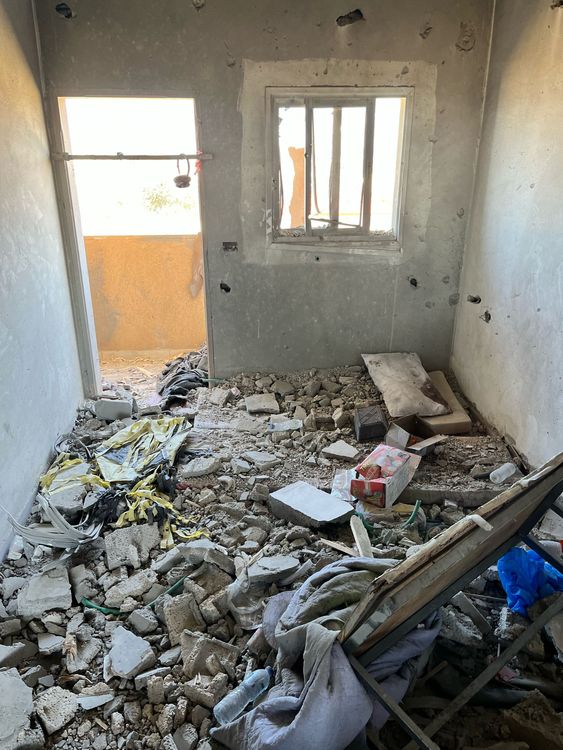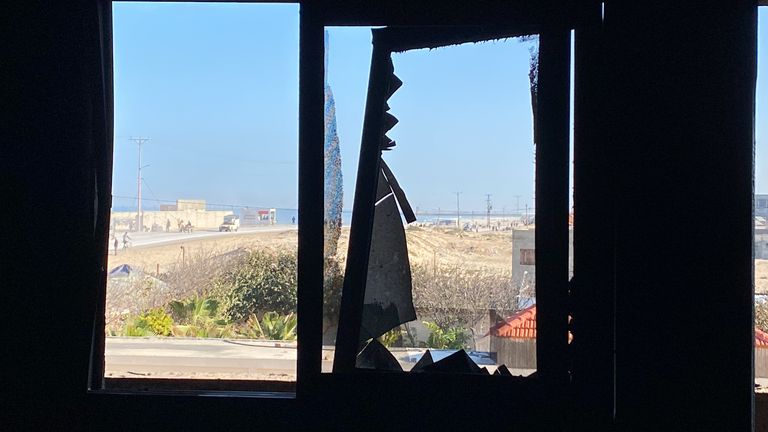“Her leg is bleeding. Carry her from below… slowly and avoid the gas cylinder… let’s get out of here, pull!” a man shouted.
It was 20 February and an aid shelter in Gaza occupied by Medecins sans Frontieres (MSF), also known as Doctors Without Borders, had been struck.
Inside, the atmosphere was chaotic. People rushed to try to put a fire out in one of the building’s rooms, as others helped another person laying on the floor.
The attack on the medical facility, which was housing 64 people including MSF drivers and their families, killed two people and injured seven others.
Using on-the-ground footage, open-source techniques and interviews with witnesses and weapons experts, a Sky News investigation has pieced together how the incident unfolded and the evidence and experts we’ve spoken to suggest it was struck by an Israeli tank round.
As a result of our investigation, the Israeli army (IDF) said it is conducting its own “examination” into the incident.
It said its forces “fired at a building that was identified as a building where terror activity is occurring”. However, it has not so far provided evidence for this claim.
The statement added: “After the incident, reports were received of the death of two uninvolved civilians in the area. The IDF regrets any harm to civilians and does everything in its power to operate in a precise and accurate manner.” It said an investigation had been launched.
The attack
The MSF shelter is located in a sparsely populated coastal area in Mawasi, south-western Gaza, around 6km northwest of the southern city of Khan Yunis.
Sky News spoke to five witnesses inside and outside the shelter and our team on the ground visited the site. The aid organisation said the contracted building was used to shelter its drivers and their families.
Two witnesses – who wish to remain anonymous and were inside the shelter – said on the night of 20 February, families were sitting inside talking before the attack took place at around 8pm.
One witness said they suddenly heard “loud noises” which sounded like a tank track. They ran to the shelter’s entrance to close it and turn off the exterior lights.
“The loud noises were getting louder as the tanks were getting closer to our shelter… And by the time I got back to the designated place… the whole building was shaking violently,” they said.
Witness ‘saw fire light up’
Another witness, a cousin of the landlord who owned the building and was sheltering at a relative’s house nearby at the time of the attack, said he also heard the “sound of tanks and gunshots” and lay on the floor.
Jihad al-Agha said he saw “fire light up” inside the MSF building and believes tanks were “roughly 20 metres away” from where he was.
He said the ground and first floor of the building were being used by MSF while members of the landlord’s family were living on the top floor.
Another neighbour also heard “sounds of the tanks and gunshots” at around 8.30pm.
Abu Hashem al-Aghar said after the attack, he left his house and “went towards the sound of women and children’s screams, saved them from the inside, the fire”.
He said he took the injured into his home and looked after them until emergency services arrived around two hours later.
A projectile enters the shelter
Sky News visited the site and obtained and analysed a trove of images and videos following the incident and corroborated them with witness testimony and expert analysis to help piece together what happened.
An image of the exterior of the building suggests that a projectile entered from the south-west facing central window on the first floor of the MSF shelter.
The picture above shows a circular hole in the top corner of one of the windows. Inside this room, a damage pattern can be seen on the ceiling – another indication that the projectile came through the window.
Using the images, Amael Kotlarski, Weapons Team Manager at Janes, a defence intelligence firm, told Sky News: “I’d say whatever came through the window, came from an upward angle and detonated either on impact with the roof, or air bursted just below it. Given the damage on the roof, I’m inclined to the latter rather than the former.”
He said the damage on the dividing wall next to the window suggests it was “blown outwards”. Based on the imagery we have seen; we identified only one entry point of this kind.
Videos filmed from inside and outside the shelter show a fire in one of the north-facing rooms of the first floor.
Witnesses and MSF said a gas canister was hit after the building was struck and caught fire.
A gas canister can be seen in the same room in aftermath imagery. However, we are unable to verify the exact cause of the fire.
What hit the building?
Former British army artillery officer and director of Chiron Resources, Chris Cobb-Smith said that given the upward trajectory of the projectile by the window, it would also “appear that the shot was fired at relatively close range”. Sky News has been unable to determine the exact distance the projectile was launched from.
“It’s difficult to draw definitive conclusions merely from imagery however I believe the damage is the result of a tank round being fired directly into the building.
“Only a tank shell would cause that type of damage. Only a tank would have the ability to launch a projectile at that range and at that trajectory and bearing.”
A collection of fragments was also pictured inside the building.
Mr Kotlarski said two types of fragments can be observed one with pre-scoring (in yellow) which are “likely to be from the shell body itself” while the small balls (in orange) are “pre-formed fragments which are likely to be stored in a matrix inside the warhead section of the shell”.
He added that the size and thickness of these indicates they “likely come from a large calibre munition”.
‘Consistent’ with tank round
Mr Cobb-Smith said the remnants are “consistent” with those of an “expended tank round” – adding that they are similar to those he has personally recovered in 2009 and 2012 while investigating the aftereffects of tank shell strikes.
He added he is “unaware of any direct fire weapons of this calibre being operated by Hamas” and that he is “doubtful that anything of this size would have been able to be deployed and fired with the amount of IDF activity in the area”.
Alongside the projectile, witnesses and MSF also told Sky News that gunfire was heard during the attack – one witness said they heard “many bullets” while on the ground floor before they said the building was hit.
MSF general director Meinie Nicolai, who visited the site soon after the attack, said bullets were fired at the front of the shelter.
Israeli presence that day
On the day of the attack, the Israeli army said on its Telegram channel that its forces were “operating” in northern, central and southern Gaza Strip and continuing “intensive operations in western Khan Younis”.
But it did not say its forces were operating in the immediate area around the shelter.
The IDF’s Arabic-language spokesperson Avichay Adraee, published an evacuation map on 20 February of two neighbourhoods further north in and around Gaza city. But this did not cover the area where the shelter is located.
What happened after the attack
Following the attack, witnesses and MSF said emergency services arrived at the scene at least two-and-a-half hours after the incident due to security concerns.
The injured were then taken to hospital.
Those killed were the wife and daughter-in-law of an MSF staff member – while the injured included four women aged 74, 29, 20 and 16 alongside twin girls – a year-and-a-half old, and a 30-year-old man. All but one of those injured were from the same family.
Ms Nicolai told Sky News she was “perplexed” by the attack on the facility.
The organisation said: “The shelter was used by humanitarian personnel and their family members, identified by an MSF flag, and notified to the Israeli authorities. We refute any allegations of terror activity occurring in MSF-run structures. It is a civilian space, and this shows that nowhere is safe.”
Ms Nicolai told Sky News that she thinks an Israeli tank fired at the building
“It seems it is a shell that was shot from a tank. And that would be an Israeli tank. So, I think, the Israeli forces are responsible,” she said.
MSF based their own conclusion on independent weapons experts who surveyed the scene and said they believe the “fragments of the shell that were recovered match the characteristics of ammunition that Israeli Merkava tanks are known to use” and spoke to colleagues who witnessed the attack. Sky News was not able to determine the exact weapon that was used.
‘No evacuation order’ issued before attack
MSF said the attack was also concerning as “no evacuation order” was issued for the building and they claimed Israeli forces knew that the building was used by MSF.
The aid organisation said Israeli forces have been “clearly informed of the precise location” of the shelter.
MSF told Sky News: “Despite the deconfliction procedures agreed with the Israeli authorities, MSF had not received any notification nor warning for evacuation prior to the attack on its shelter.”
Ms Nicolai added: “Israel has reconfirmed they had the coordinates of this building.”
The Israeli army did not respond to a Sky News request for comment on whether they knew the coordinates of the shelter.
Flagged building
An MSF flag outside the building indicated that it was used by MSF as a medical facility. Sky News obtained images taken the day after the attack showing the flag outside the building’s entrance. Our Gaza team has since visited the site and seen the flag outside the building.
International law
Hospitals and, in general, medical facilities, are given special protections under international humanitarian law meaning they cannot be attacked.
Oona Hathaway, an international law professor at Yale Law School said these facilities are “presumed to be civilian objects and not subject to targeting during armed conflict”. She said these protections also cover medical staff and those “playing a role in providing medical support”.
She added: “They can lose that status if they are used for military purposes”, but added there must be a “demonstration” that they have been used for those military purposes “before any kind of attack is permissible against a medical facility”.
Ms Hathaway said that if the Israeli army was responsible for the attack and intentionally targeted a civilian object then it is “potentially a war crime”.
She said: “There are a number of questions that are going to have to be asked. So first is did they, in fact have a legitimate military objective? What was the intelligence that they had, if any, or reason to believe that they had, that this was being used for military purposes?
“If they didn’t have that information, if they didn’t know that was being used for military purposes, then it isn’t a legitimate military objective. And then if they’re intentionally targeting a civilian object, in particular a civilian object that’s being used by military, by medical personnel, that is a violation of the Geneva Conventions and potentially a war crime.”
In response to our investigation, the Israeli army said: “During operational activity in Khan Yunis, the IDF forces fired at a building that was identified as a building where terror activity is occurring. After the incident, reports were received of the death of two uninvolved civilians in the area.
“The IDF regrets any harm to civilians and does everything in its power to operate in a precise and accurate manner in the combat field.
“As part of the lesson learn process the IDF conducts during the combats, the IDF began an examination of the incident.”
It added that the incident would be examined by the Israeli Army’s General Staff’s Fact Finding and Assessment Mechanism – which it says is an “independent” body responsible for examining exceptional events that take place during war.
Editorial: Adam Parker, OSINT editor, Natasha Muktarsingh, assistant editor Data & Forensics, Chris Howard, editor Data & Forensics
Additional reporting: Tom Cheshire, Data & Forensics correspondent and Sky News team in Gaza
Production: Michelle Inez Simon, visual investigations producer
Graphics: Taylor Stuart, designer
The Data and Forensics team is a multi-skilled unit dedicated to providing transparent journalism from Sky News. We gather, analyse and visualise data to tell data-driven stories. We combine traditional reporting skills with advanced analysis of satellite images, social media and other open source information. Through multimedia storytelling we aim to better explain the world while also showing how our journalism is done.
